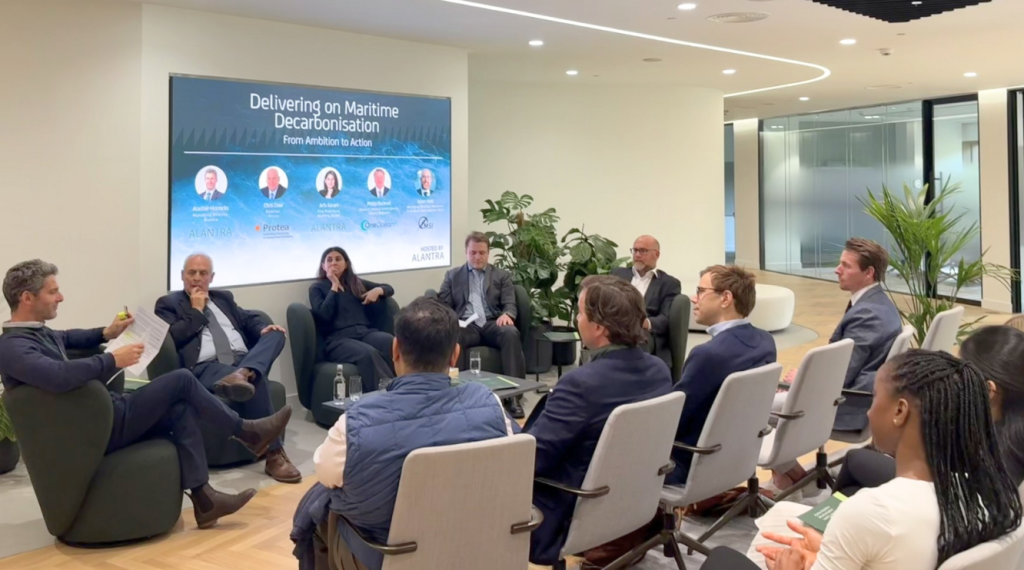In June 2025, Alantra convened a panel of industry leaders to explore how the maritime sector is moving from climate ambition to real-world implementation. Held in London and titled “Delivering on Maritime Decarbonisation: From Ambition to Action,” the session followed the launch of Alantra’s Maritime Decarbonisation Leaders Report.
Moderated by Alastair Horrocks, Managing Director at Alantra, the panel featured Adam Kent (Maritime Strategies International), Arfa Karani (Alantra Klima), Phillip Bucknell (OneOcean), and Chris Daw (Protea). The speakers brought varied perspectives spanning chartering dynamics, capital deployment, operational technologies, and emissions data – highlighting the complexity and urgency of the transition.

Setting the Scene
The maritime industry is under intensifying pressure to decarbonise – but progress remains uneven. While net-zero targets are now widely accepted, there is a growing gap between headline ambitions and scalable delivery models. Regulatory frameworks such as FuelEU Maritime and the EU ETS are beginning to shape behaviour in specific geographies, yet many shipowners and operators still face unclear economics, patchy infrastructure, and limited incentives.
“The targets are clear, but the pathway isn’t. Our goal with this panel was to explore how ambition becomes action – commercially, operationally, and financially.” – Alastair Horrocks, Alantra
At the same time, the transition is not just about fuel. Decarbonisation in maritime requires a system-wide shift – aligning chartering dynamics, vessel technologies, digital performance tools, and capital flows. It also requires greater clarity around who carries the cost and who benefits. The panel was convened to explore these tensions, and to surface where real progress is being made – and what’s still holding it back.

A Fragmented Market
A key theme was the fragmentation of incentives across the global fleet. While energy efficiency is beginning to influence chartering decisions – particularly among ESG-driven cargo owners – a clear and consistent premium for greener ships has yet to materialise across the broader market.
“There’s still no consistent premium for greener ships. It really depends on who you are and who your customers are.” – Adam Kent, Maritime Strategies International
The panel noted that as much as 60% of the global fleet continues to operate without regulatory or commercial pressure to upgrade. Without stronger signals from either charterers or regulators, these owners are unlikely to invest in low-emission technologies.
Efficiency First: Proven Measures Within Reach
Despite this uneven playing field, the panel pointed to near-term opportunities that are both economically viable and technologically mature. Energy-saving retrofits – including voyage optimisation software, hull coatings, air lubrication systems, and wind-assisted propulsion – offer proven emissions reductions and fast payback periods.
However, uptake remains inconsistent. Operational conservatism, complex certification requirements, and a lack of standardisation are all contributing to the slow adoption of these technologies.
” Shipowners and operators have fuel-agnostic alternatives, such as voyage routing and hull performance monitoring, which can assist them today, prior to switching to another type of fuel. These practices can be implemented fast and with no downtime.” – Phillip Bucknell, OneOcean
Fuel Transitions: Infrastructure and Economics Still Lag
Larger investment decisions – particularly around main engines and alternative fuels like LNG, ammonia, or methanol – remain more complex. The infrastructure to support widespread fuel transition is not yet in place, and the current economics often don’t justify the higher capital expenditure.
The panelists agreed that while these technologies will likely play a role in the long-term transition, they are unlikely to scale without further regulatory and commercial incentives.

Investment Outlook: Risk, Return, and Readiness
From an investment perspective, the conversation focused on the need for financing models that reflect the realities of a transitioning sector. Blended finance, leasing structures, and long-term customer contracts were cited as tools that could help de-risk capital deployment and attract institutional investors.
“We can’t invest on regulation alone. The numbers need to work – and only now are we seeing segments, like short-sea ferries, where they finally do.” – Arfa Karani, Alantra Klima
These financial frameworks will be especially critical for enabling the adoption of unproven or capital-intensive solutions, where traditional risk-return expectations may not yet apply.
Regulation and Market Confidence
There was consensus on the role of regulation in shaping decision-making across the sector. The EU ETS and FuelEU Maritime were discussed as frameworks that, while administratively burdensome today, could help build confidence in more structured investment and operational planning.
In time, these policies may also serve as reference points for wider international alignment through the IMO. While regional regulation adds short-term complexity, the panel agreed that it is a necessary step toward global progress.

The Role of Measurement and Carbon Capture
Measurement and data emerged as another critical enabler. Accurate, real-time emissions monitoring can reduce compliance costs and lay the groundwork for future technologies like onboard carbon capture.
“Carbon capture in maritime is coming. It’s not perfect yet, but we’re already measuring the difference it can make.” – Chris Daw, Protea
Direct measurement, Daw noted, can help operators better understand their emissions profile – creating the transparency and accountability needed to improve performance and verify progress.
A Defining Moment for the Sector
In closing, the panel shared forward-looking reflections on where they would place their capital and strategic focus today. Priorities included biofuels as a high-demand, short-supply near-term option; digital solutions for operational optimisation; and scalable pilot projects that build confidence in emerging technologies.
What emerged across the conversation was not a lack of ambition or innovation – but a need to align incentives, scale adoption, and create investable conditions for change. The maritime sector, the panel agreed, has entered a decisive window in which regulatory clarity, investor engagement, and operational collaboration must come together to accelerate progress.
Alantra remains committed to helping clients navigate this complex transformation. As both a strategic advisor and an advocate for sustainable innovation, we will continue to connect stakeholders across the value chain to accelerate progress – from ambition to action.
Alantra’s Maritime Expertise
Alantra’s Maritime and Offshore team advises clients across both conventional and specialist shipping sectors, including Dry Bulk, Tankers, Containers, Offshore, and Passenger Ferries. We offer global expertise in M&A, capital raising, and restructuring, with a presence in key shipping hubs such as Greece, the Nordics, Germany, Italy, China, and the Middle East. Our team combines deep investment banking and marine engineering experience, supported by a broad investor network of strategic and financial partners worldwide.



